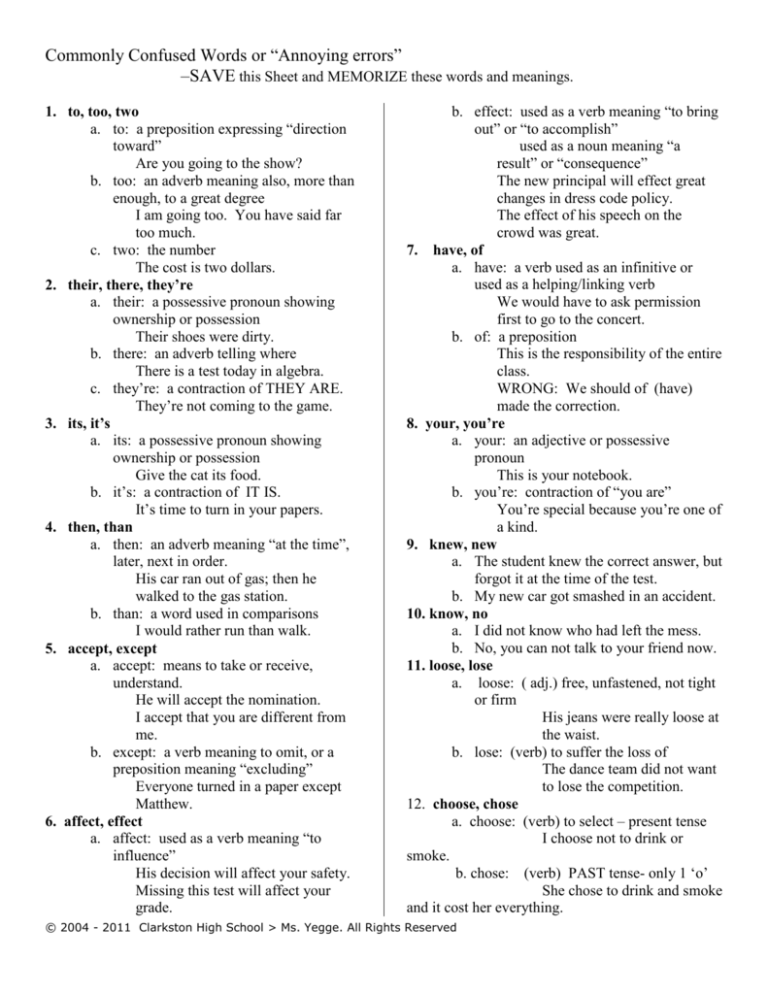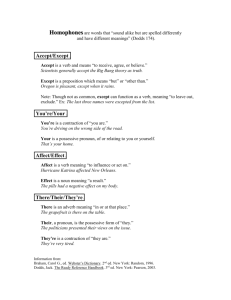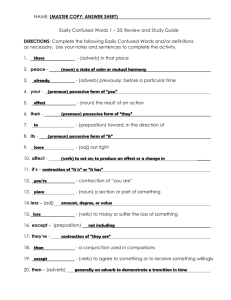
Commonly Confused Words or “Annoying errors”
–SAVE this Sheet and MEMORIZE these words and meanings.
1. to, too, two
a. to: a preposition expressing “direction
toward”
Are you going to the show?
b. too: an adverb meaning also, more than
enough, to a great degree
I am going too. You have said far
too much.
c. two: the number
The cost is two dollars.
2. their, there, they’re
a. their: a possessive pronoun showing
ownership or possession
Their shoes were dirty.
b. there: an adverb telling where
There is a test today in algebra.
c. they’re: a contraction of THEY ARE.
They’re not coming to the game.
3. its, it’s
a. its: a possessive pronoun showing
ownership or possession
Give the cat its food.
b. it’s: a contraction of IT IS.
It’s time to turn in your papers.
4. then, than
a. then: an adverb meaning “at the time”,
later, next in order.
His car ran out of gas; then he
walked to the gas station.
b. than: a word used in comparisons
I would rather run than walk.
5. accept, except
a. accept: means to take or receive,
understand.
He will accept the nomination.
I accept that you are different from
me.
b. except: a verb meaning to omit, or a
preposition meaning “excluding”
Everyone turned in a paper except
Matthew.
6. affect, effect
a. affect: used as a verb meaning “to
influence”
His decision will affect your safety.
Missing this test will affect your
grade.
b. effect: used as a verb meaning “to bring
out” or “to accomplish”
used as a noun meaning “a
result” or “consequence”
The new principal will effect great
changes in dress code policy.
The effect of his speech on the
crowd was great.
7. have, of
a. have: a verb used as an infinitive or
used as a helping/linking verb
We would have to ask permission
first to go to the concert.
b. of: a preposition
This is the responsibility of the entire
class.
WRONG: We should of (have)
made the correction.
8. your, you’re
a. your: an adjective or possessive
pronoun
This is your notebook.
b. you’re: contraction of “you are”
You’re special because you’re one of
a kind.
9. knew, new
a. The student knew the correct answer, but
forgot it at the time of the test.
b. My new car got smashed in an accident.
10. know, no
a. I did not know who had left the mess.
b. No, you can not talk to your friend now.
11. loose, lose
a. loose: ( adj.) free, unfastened, not tight
or firm
His jeans were really loose at
the waist.
b. lose: (verb) to suffer the loss of
The dance team did not want
to lose the competition.
12. choose, chose
a. choose: (verb) to select – present tense
I choose not to drink or
smoke.
b. chose: (verb) PAST tense- only 1 ‘o’
She chose to drink and smoke
and it cost her everything.
© 2004 - 2011 Clarkston High School > Ms. Yegge. All Rights Reserved
13. quiet, quite
a. quiet: (adj.) still, silent
All the bus driver wanted was
a bit of peace and quiet.
b. quite: (adverb) completely or entirely,
considerably or very
"All this is quite ridiculous!"
my mother exclaimed.
14. weather, whether
a. weather: (noun) atmospheric conditions
We watched the weather
channel for updates about the
forecast in Florida.
b. whether (conjunctive adverb) A
conjunction that expresses an alternative
"Whether I was planning to
give you the money or not, is
not the problem here!"
15. who's, whose
a. who's: Contraction of "who is" (slang
usage)
Who's supposed to go with me to the
store?
b. whose: possessive form of who
Whose glove is this?
16. lets/let’s
A. Let’s = let us
Let’s go meet them at the mall.
c. lets = allows
This homework pass lets you turn in
one assignment late.
17. led/lead
a. led = past tense of lead
I led them to the creepy basement.
b. lead = verb =to start off with others
following, or lead –noun-lead paint or
pencil.
I will not lead you astray.
18. we’re/were
we’re = contraction – we are
We’re going to show you how to win
a game.
were = past tense verb of be
They were ready to cry when they
heard that from us.
19. where/were
where = place
were = past tense of verb of be
“Where have you been?” Mom
asked, just holding in her anger.
“We were over at the soccer game.”
WORDS TO NEVER SPELL INCORRECTLY EVER AGAIN:
a lot = two words
definitely
someone = 1 word
throughout = 1 word
myself = 1 word
beginning
surprise
beautiful
college
writing writer
author
literature
academic
separation
interesting
Book Titles or Book Titles NOT “Book Titles”
Movie Titles or Movie Titles NOT “Movie Titles”
“Song titles” “Poem Titles” “Article Titles”
Good vs. Well
Good = adjective – modify nouns
Well = adverb- modifying a verb – in a proper manner
/
Well = adjective =healthy
All Languages are capitalized - French, Spanish, English, German, Japanese
Grammar not grammer
CAPITALIZE “I” always!
Write out words you, because, with, people, etc. This is school time, not texting time.
Write out #s as words when under 100.
© 2004 - 2011 Clarkston High School > Ms. Yegge. All Rights Reserved









